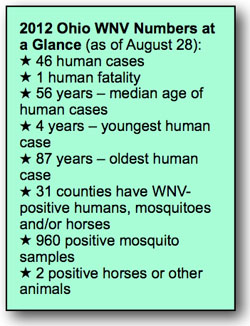First human Ohio WNV death reported
Ohio Dept. of Health information
COLUMBUS — Ohio’s first human death in a 2012 West Nile virus (WNV) case was reported by the Ohio Department of Health (ODH), which also continues to see widespread West Nile human infection. The 76-year-old Hamilton County man was hospitalized with encephalitis.
“We continue to see growing numbers of human cases of West Nile Virus infection and positive mosquito samples throughout the state,” said ODH Director Ted Wymyslo, M.D. “Ohioans should remain vigilant and take all reasonable precautions to protect themselves against mosquito bites.”
 So far in 2012, Ohio has recorded 49 human cases of West Nile virus and 960 positive mosquito samples. At this time last year, ODH had only recorded two human cases and 450 positive mosquito samples. The percentage of mosquitoes testing positive for West Nile virus so far in 2012 has been higher than in any year since 2002. By the end of the 2002 season, Ohio had 441 human WNV cases and 31 fatalities.
So far in 2012, Ohio has recorded 49 human cases of West Nile virus and 960 positive mosquito samples. At this time last year, ODH had only recorded two human cases and 450 positive mosquito samples. The percentage of mosquitoes testing positive for West Nile virus so far in 2012 has been higher than in any year since 2002. By the end of the 2002 season, Ohio had 441 human WNV cases and 31 fatalities.
Culex mosquitoes (the type that transmit WNV) do well in drought-like conditions, preferring to breed in organically rich water sources, such as shrinking water in ditches and catch basins. Recent heat across the region has also sped up the mosquitoes’ life cycle and virus amplification.
To avoid possible infection from mosquito bites:
- Wear long pants, a long-sleeved shirt, shoes and socks, especially if you are outdoors between dusk and dawn when mosquitoes are most active.
- Wear light colors, which are least attractive to mosquitoes.
- Use insect repellent and follow the label directions.
To eliminate mosquito breeding sites near homes:
- Remove all discarded tires and other water-holding containers, such as tin cans and unused flowerpots, from your property.
- Eliminate standing water from property.
- Make sure all roof gutters are clean and properly draining. Clean and chlorinate pools, outdoor saunas and hot tubs; keep them empty when not in use and drain water from pool covers.
- Check rain barrels weekly and prevent them from becoming a mosquito-breeding source.
- Change water in bird baths weekly.
West Nile virus can have no symptoms, or can lead to West Nile fever or severe West Nile disease.
Most people (about 4 out of 5) who are infected with WNV will not develop any type of illness. However, people cannot know ahead of time if they’ll get sick once infected.
The Centers for Disease Control and Prevention (CDC) estimate that about 20 percent of people who become infected with WNV will develop West Nile fever. Symptoms include fever, headache, tiredness, and body aches, occasionally with a skin rash and swollen lymph glands. While the illness can be as short as a few days, even healthy people have reported being sick for several weeks.
CDC estimates that approximately 1 in 150 persons infected with WNV will develop a more severe form of disease, such as West Nile encephalitis or meningitis or West Nile poliomyelitis:
Severe symptoms include headache, high fever, neck stiffness, stupor, disorientation, coma, tremors, convulsions, muscle weakness and paralysis.
Serious illness can occur in people of any age; however, people over age 50 and some immune-compromised persons (for example, transplant patients) are at the highest risk for getting becoming ill when infected with WNV.
Ohio has recorded human cases of WNV each year since 2002. There were 108 in 2003, 12 in 2004, 61 in 2005, 48 in 2006, 23 in 2007, 15 in 2008, two in 2009, five in 2010 and 21 in 2011.
For more information, visit the ODH website at www.odh.ohio.gov or the ODH mosquito information page: http://1.usa.gov/l8HkPt.
POSTED: 08/31/12 at 6:18 am. FILED UNDER: News







